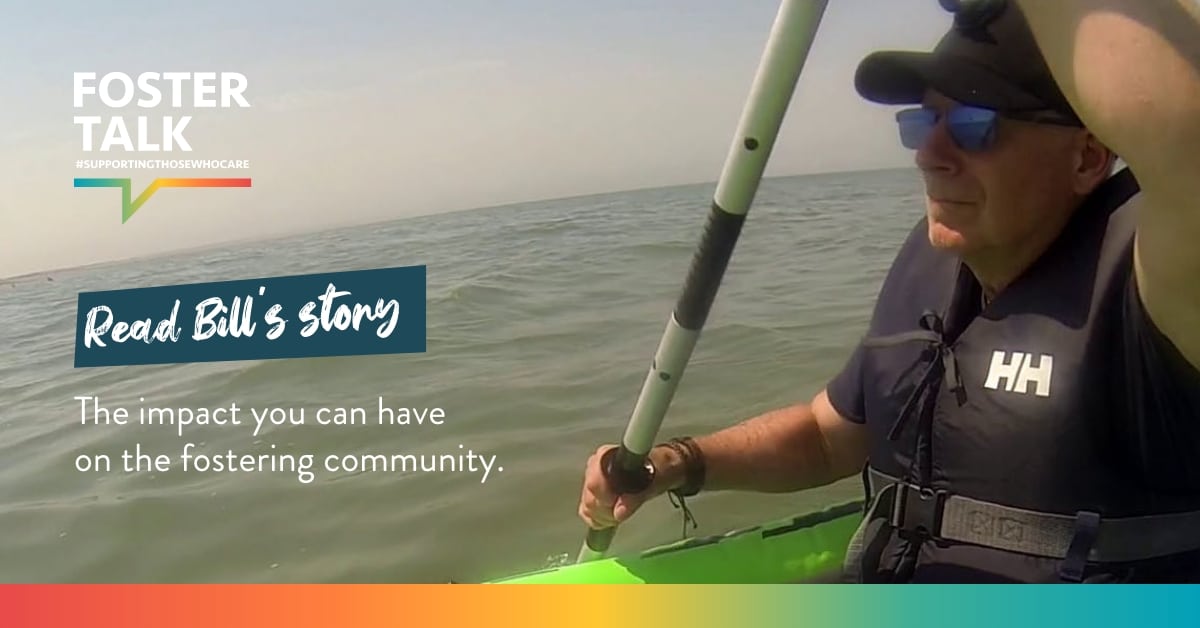Bill Lowdell is a 58-year-old father of three and a grandparent to two. He has two brothers and a sister and four older half-sisters! He’d been a website / graphic designer for 25 years, as well as a working and travelling musician before he started sitting on a fostering panel.
He said; “I sat on physical fostering panels on a part time basis. When the Covid pandemic hit, fostering panels became virtual and for me, have stayed this way. Whilst initially missing the face-to-face interaction, the positive side to this, is that as an adult care leaver and panel member of 20 years, my first-hand care insight and experience is valued and sought after, something I am immensely proud of and which has led to this becoming my main employment, sitting for various
regions throughout the UK … which I am very happy about!”
Tell us your care story, how did you find yourself within the care system?
I guess my journey into care initially started when my mother passed away in 1970 when I’d just turned 6. Myself and my three siblings (older brother, younger sister and brother),were then cared for by my older half- sister and father, in the family home.
For many reasons, this was a fraught, often difficult and unhealthy domestic situation, after four years, ultimately resulting in our caregiving sister leaving after a breakdown. Our father then made the decision, unbeknown to us, to place us in care. After a brief stay with family friends, we were separated, two older brothers taken to one residential children’s home and younger sister and brother to another. Thus, our lives would change forever and our journey through the care system began.
Do you remember your first placement – how did you feel?
By the time of my first foster placement, I had become very institutionalised. I had lost all notion of what ‘normal’ family life was, not that I had had any real experience of it up to that point in my young life but my first foster parents were good and kind people and made me very welcome. They had seen and answered an advertisement in the local newspaper, ‘David Needs a Home’. I do remember prior to this, being highly embarrassed by this ad, as anyone who knew me, had known it was me, despite the Social Services Department disguising me as ‘David’ in a poor and misguided attempt at my anonymity! I do however remember the excitement, tinged with a little trepidation at this new start, in the countryside with this good family. I got on particularly well with my foster brother, with whom I shared a room, as well as musical taste of the time and humour. We still see each other to this day from time to time and get on well. I was however almost fourteen years old by this time and had developed an extreme dislike for authority and being told what to do and so I inevitably, subconsciously, and sadly, slowly broke the placement down.
Thirty-five years later, I surprise visited them all to thank them for what they had done for me and they were every bit as kind and welcoming as they were the first day I went to live with them.
What one word describes you today and why?
Reflective! Having spent a considerable amount of my young adult life being subconsciously angry and regretful of my childhood experiences, almost fifty years since first entering the care system and twenty years as a fostering panel member have taught me that reflection and learning from it is everything! We must learn and grow from our life experiences, whether we have been in care or not and whether we are birth parents or foster parents.
What message would you like to give to fellow foster children currently in care?
Try not to be angry at the way your life has turned out so far. Do your best to be kind to yourself and others … and know that you ARE worth something and valued as a young person. Don’t ‘bottle
up’ emotions, talk to somebody when you’re sad or upset, believe me, this DOES help. Always try to remember that your foster parents are doing their best for you!
What advice would you give prospective foster carers thinking of becoming carers?
You must possess a genuine desire to make a difference to a possibly troubled, sometimes traumatised or frightened young person’s life. You must also endeavour to learn as much as you can about the background and journey of any young person coming into your care. This will help you to understand them better, their behaviours, moods and traits, and ultimately help you to care for them in the best possible way you can. Try not to look at fostering through rose tinted glasses! It can be extremely rewarding but also very difficult. Do your very best, however difficult, to not give up on a child or young person in your care, or you may just be another in the long line of adults or caregivers who already have. When I talk to people and tell them about my background and work on fostering panels, the most common observation or comment I get is “It must be good to give something back. Well, I can tell you that it is! It’s strange to think that I almost gave it up after a few years, as I felt out of my depth and unable to reflect, but now, years later, I have an understanding of myself and my journey through care that puts me in the unique position to always approach things from the child’s angle, as well as having an understanding of what foster carers are dealing with on a day to day basis.

